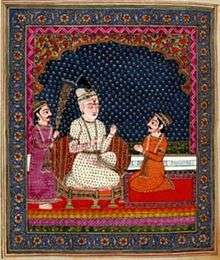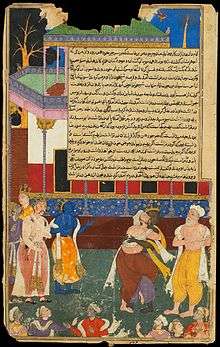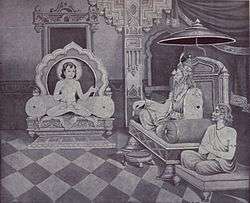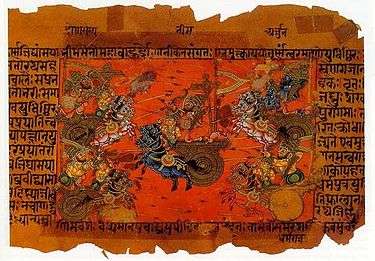Dhritarashtra
| Dhritarashtra | |
|---|---|
 The blind king Dhrtarastra listens as the visionary narrator Sanjaya relates the events of the battle between the Kaurava and the Pandava clans | |
| Information | |
| Spouse(s) | Gandhari |
| Children |
Duryodhana, Dushasana, Vikarna and 97 other sons and Duhsala (daughter) from his wife Gandhari Yuyutsu from Sughada (Gandhari's maid) |
In the Mahabharata, Dhritarashtra (Sanskrit: धृतराष्ट्र, dhṛtarāshtra; lit. "a good king"[1]) is the King of Hastinapur at the time of the Kurukshetra War, the epic's climactic event. He was born the son of Vichitravirya's first wife Ambika, and was fathered by Veda Vyasa. Dhritarashtra was blind from birth,[2] and became father to one hundred sons (and one daughter) by his wife Gandhari (Gāndhārī), with Yuyutsu. These children, including the eldest son Duryodhana, came to be known as the Kauravas. Throughout his reign as King of Hastinapur, Dhritarashtra was torn between the principles of dharma and his love for his son Duryodhana, and often ended up endorsing his son's actions merely out of fatherly love. Dhritarashtra appears in Mahābhārata sections that have been circulated as separate scriptures, most notably the Bhagavad Gita, whose dialogue was narrated to him.
Birth and Early Life
With Vichitravirya having died of sickness, Bhishma unable to take the throne because of his vow, and Bahlika's line unwilling to leave Bahlika Kingdom, there was as succession crisis in Hastinapur. Satyavati invites her son Vyasa to impregnate the queens Ambika and Ambalika under the Niyoga practice. When Vyasa approached Ambika, she got frightened due to his scary appearance and closed her eyes; hence, her son was born blind.
Dhritarashtra, along with his younger half-brother Pandu is trained in the military arts by Bhishma and Kripacharya. Hindered by his handicap, Dhritarashtra is unable to wield weapons, but is said to be so strong that he can crush iron with his hand.[3]
When it came time to nominate an heir, Vidura suggested that Pandu would be a better fit because he wasn't blind. Though bitter at the result, Dhritarashtra willingly conceded the crown, though this act would flower into the protectiveness he would have over his crown later in life.[4] Dhritarashtra marries Gandhari of Hastinapur's weakened and lowly vassal Ghandar; Gandhari covers her eyes with cloth in order to better understand her husband's blindness.[5]He and Gandhari had one hundred sons, called the Kauravas and one daughter Dushala. He also had a son named Yuyutsu with Sauvali (concubine).
Dhritarashtra becomes Pandu's heir and rules when Pandu is not in Hastinapur. After the incident with Rishi Kindama Pandu retired to the forest. Hence, Dhritarashtra became the de facto king. Through the blessings of Durvasa, he and Gandhari have one hundred sons and a daughter, with his oldest son, Duryodhana, becoming his heir. Upon Duryodhana's birth, ill omens appeared; many sages and consultants advised Dhritarashtra and Gandhari to abandon the baby. But they refused to do so; Duryodhana grows up with a princely education and looks like he will be a great heir. However, when Pandu dies, Dhritarashtra's brother's family comes to Hastinapur, living alongside Dhritarashtra's children. Yudhishthira, Pandu's eldest son, is older than Duryodhana. Given that Pandu was the king and that Yudhishthira is born of the god Dharma, he has a strong claim to the throne. A succession crisis begins; though recognizing Yudhishthira's merits, Dhritarashtra favours his own son, blind to his faults. Upon much pressure from the Brahmin council, Vidura, and Bhishma, Dhritarashtra reluctantly names Yudhishthira as his heir.
After the lakshagraha incident, in where the Pandavas are apparently killed, Dhritarashtra mourns but is able to finally name Duryodhana as his heir. When the Pandavas are revealed to have survived, Duryodhana refuses to cede his title as heir when the obviously sour relations between the Kauravas and the Pandavas come to focus. Dhritarashtra splits the country in two, giving Hastinapur to Duryodhana and Khandavprastha to Yudhishthira.
The dice game

Shakuni, Gandhari's brother, was a master of sorcery. He along with his nephew Duryodhana conspired the game of dice and invited Pandavas in this game of gambling. Pandavas eventually lost their kingdom, wealth, prestige and were exiled for thirteen years. Draupadi, wife of Pandavas was humiliated in the court after Dushasana tried to disrobe her. The helpless blind king only intervened after counseling with Gandhari when Draupadi was going to curse the Kuru dynasty. Though individuals like Vikarna and Vidura objected to the wrongdoing of Duryodhana, most of the spectators were helpless due to their obligations to Hastinapur; Dhritarashtra could have spoken out but did not.
Battle of Kurukshetra

Lord Krishna as a peace emissary of Pandavas traveled to Hastinapura persuading Kauravas to avoid bloodshed of their own kin. However, Duryodhana conspired to arrest him that resulted in failure of mission. After Krishna's peace mission failed and the war seemed inevitable, Vyasa approached Dhritarashtra and offered to grant him divine vision, so that Dhritarashtra could see the war. However, not willing to see his kin slaughtered, Dhritarashtra asked that the boon be given to Sanjaya his charioteer. Sanjaya dutifully narrates the war to his liege, reporting how Bhima killed all his children. Sanjaya would console the blind king while challenging the king with his own viewpoints and morals. When Lord Krishna displayed his Vishvarupa (Universal Form) to Arjuna on the battlefield of Kurukshetra, Dhritarashtra regretted not possessing the divine sight.[3]
Dhritarashtra was confident that Bhishma, Drona, Karna and other invincible warriors would make the Kaurava camp victorious. He rejoiced whenever the tide of war turned against Pandavas. However, the results of the war devastated him. All of his trueborn sons were killed in the carnage. Dhritarashtra's only daughter Duhsala was widowed. Yuyutsu had defected to Pandava side at the onset of war and was the only son of Dhritrashtra who had managed to survive Kurukshetra War.[6]
Crushing of Bhima's metal statue

Dhritarashtra was furious with Bhima for mercilessly slaying all his sons, especially Duryodhana. After the war ended, the victorious Pandavas arrived at Hastinapur for the formal transfer of power. The Pandavas go to embrace their uncle and give their respects. Dhritarashtra hugged Yudhishthira heartily. When Dhritarashtra turned to Bhima, Lord Krishna sensed the danger and asked Bhima to move Duryodhana's iron statue of Bhima (used by the prince for training) in his place. Dhritarashtra crushed the statue with into pieces, and then broke down crying, his anger leaving him. Broken and defeated, Dhritarashtra apologized for his folly and wholeheartedly embraced Bhima and the other Pandavas.[7]
Later years and death

15 years after the great war of Mahabharat, the grief-stricken blind king along with his wife, sister-in-law Kunti, and brother Vidura left Hastinapur for penance. It is believed that all of them perished in a forest fire and attained Moksha.[8]

References
- ↑ Apte, Vaman Shivaram (1957). "धृतराष्ट्र". A practical Sianskrit-English Dictionary. Poona: Prasad Prakashan.
- ↑ "Hinduism: An Alphabetical Guide", by Roshen Dalal, p. 230, publisher = Penguin Books India
- 1 2 Ganguli, Kisari Mohan. The Mahabharata of Krishna-Dwaipayana Vyasa Translated into English Prose by Kisari Mohan Ganguli. N.p.: n.p., n.d. Web.
- ↑ Kalyāṇakara, Bā Ha. Dhr̥tarāshṭra. Nāgapūra: Ākāṅkshā Prakāśana, 2007.
- ↑ Suri, Chander Kanta. The Life and times of Shakuni. Delhi: for All, 1992. Print
- ↑ Yuyutsu was one of the 11 who managed to survive the war.
- ↑ During the Kurukshetra War
- ↑ Dhritarashtra, Gandhari and Kunti proceed to forest

